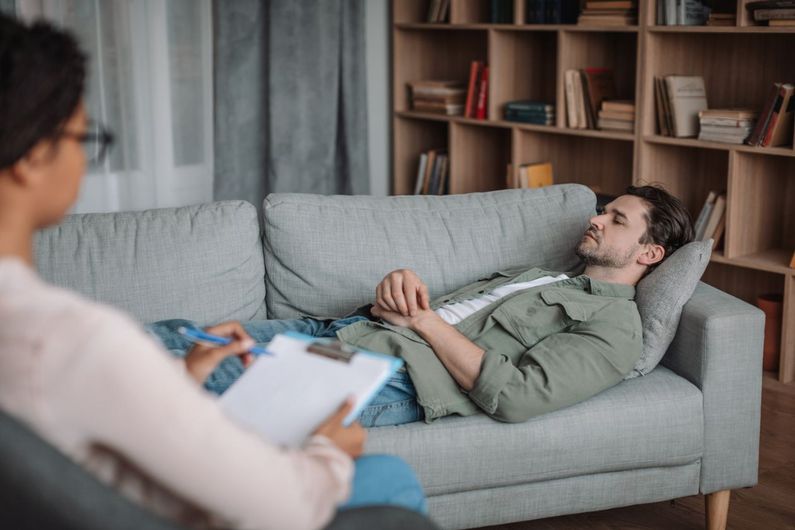You're getting sleeeepy... now where does it hurt?
- UdeMNouvelles
01/12/2024
- Martin LaSalle
Hypnosis can improve the quality of life of people suffering from chronic pain, according to a new research led by UdeM associate medical professor David Ogez.
After an accident in 2018, Maryse Aubin was left with nerve damage in her left leg and had to walk with a cane. Suffering constant pain, she was prescribed medication and got cortisone injections, but none brought her much relief. In the end, the Grade 3 teacher had to face the hard fact: the active lifestyle she used to have was over, for now.
Aubin was referred to the Maisonneuve-Rosemont Hospital pain clinic, which is staffed by a multidisciplinary medical team. Here she met clinical researcher David Ogez, who suggested a novel treatment: hypnosis. The hope was the treatment might help Aubin change her perception of pain and let go of the frustration and anger that were tainting her well-being.
"I was pretty skeptical at first," she recalls. "But when I heard that (Ogez) was actually researching hypnosis, I decided to give it a try, even though I didn't think it would work."
Aubin set out to master the technique, which is similar to deep meditation, and adapt it to fit her daily routine. Today, she's progressed so well that her pain is now under control and she's able to walk without a cane.
Two-phase research project
Aubin's improvement is no miracle. It's testament to the dedication she's brought to the program developed by Ogez, who is also an associate professor in the Department of Anesthesiology and Pain Medicine at Université de Montréal.
His research project, which received funding from Fonds de recherche du Québec's Engagement program, was conducted in two phases.
First, the researchers conducted an exploratory study with a group of 20 chronic pain sufferers, including Aubin, who acted as both a patient/partner and co-author of the project. The goal was to collect participants' impressions on an established hypnosis program and get their suggestions on how to improve it.
The next step was to do a qualitative study to assess the program's subjective effectiveness: meaning, essentially, how the participants felt after undergoing a number of hypnosis sessions. At this point, however, COVID-19 reared its head.
"We had only completed two series of sessions at the clinic, and then the pandemic hit," explained Ogez. "Although I was initially against practising remotely, I had no choice but to continue the study via Zoom. Ultimately, this method turned out to be better for the patients because they found it easier to get comfortable in their own homes."
At this stage, there were 17 people participating in the study, helping the researchers track two things: how guided hypnosis affected their levels of pain and anxiety, and how self-hypnosis affected their quality of life.
Months of lasting benefits
After the guided hypnosis sessions, most participants reported feeling less pain, anxiety and stress, as well as an improved sense of calm.
"Self-hypnosis was also associated with a decrease in pain, but for fewer participants," said Ogez. "But anxiety subsided for most of them."
And the benefits of hypnosis were still felt six months after the end of the research program.
"The biggest difference was in participants' quality of life," said Ogez. "Their physical capabilities improved, allowing them to be more mobile and regain the ability to do everyday tasks. It also helped allay any kinesiophobia, the fear of physical activity because it might cause pain."
A third project phase is now underway to see if these results can be confirmed using objective data.
Even though self-hypnosis proved to be a life-changing practice for Aubin, she makes no secret of the fact that it took an incredible amount of determination to appreciate an improvement in her quality of life.
"Through analgesic hypnosis—and a lot of reading on the subject—I've learned to change the way I perceive pain, to the point that I even find it useful," she said. "The practice has helped me gain self-knowledge and tap into strength I never knew I had, like my mind's ability to imagine situations and manifest the best for myself."
Chronic pain affects one in four Canadians
Chronic pain, which is defined as pain that lasts for more than six months, affects one in four Canadians—some 7.63 million people over the age of 15—according to 2019 data.
In addition to causing physical suffering and psychological distress, "chronic pain has a significant impact [...] on society and the economy, with direct and indirect costs totalling between $38.3 billion and $40.4 billion in 2019," according to a 2020 report published by the Canadian Pain Task Force.















